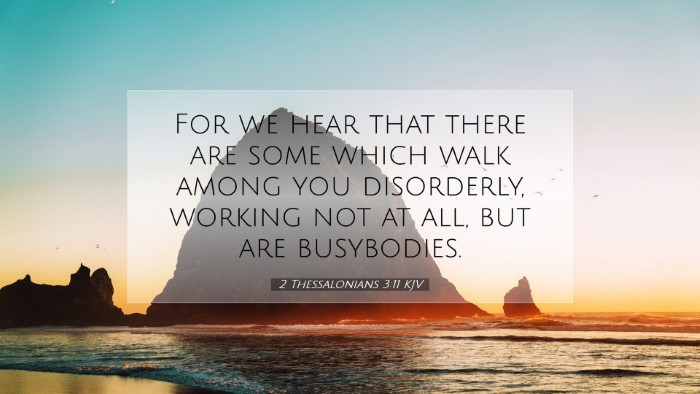Commentary on 2 Thessalonians 3:11
Verse: "For we hear that there are some which walk among you disorderly, working not at all, but are busybodies."
Introduction
The Apostle Paul, in his second epistle to the Thessalonians, addresses a pressing issue within the church. 2 Thessalonians 3:11 points to a troubling phenomenon: certain individuals in the congregation are described as "disorderly," engaging in idleness and meddling into the affairs of others rather than contributing meaningfully to the community. This verse serves as both a warning and a call to action, enlightening the church on the importance of responsible conduct and labor.
Exegesis of the Verse
Paul's admonition in this passage reflects the socio-religious context of the early church, where some members misunderstood the doctrine of Christ’s imminent return. They adopted a posture of inactivity, which led to the disruption of communal harmony. The phrase "walk among you disorderly" indicates that these individuals are not just temporarily behaving inappropriately; rather, their lifestyle is characterized by a pattern of disorder.
Commentaries Overview
-
Matthew Henry
Henry emphasizes the importance of maintaining good order within the church. He argues that idleness often leads to meddling, which disrupts the unity of the body of Christ. He points out that the troubles of a busybody are compounded as they become more entangled in the affairs of others, leading to discord and gossip.
-
Albert Barnes
Barnes highlights Paul’s intent to correct the behavior of the idlers. His commentary provides insights on the contrast between being busy with work and being busy with meddling. He contends that every member of the church has a responsibility to contribute to its well-being and that idleness is not a neutral act; rather, it leads to the deterioration of the community's moral fabric.
-
Adam Clarke
Clarke provides a penetrating exploration of the term "busybodies." He notes that such behavior reflects a misuse of time and energy, warning against the natural human tendency to turn towards the affairs of others instead of focusing on one's obligations. He advocates for constructive engagement over idleness as a fundamental element of Christian life.
Theological Implications
This verse has significant theological implications regarding the nature of Christian community and the ethical conduct expected from believers. It emphasizes that every member has a vital role within the body of Christ, echoing the imagery found in 1 Corinthians 12 about the interconnectedness of all believers.
Community Responsibility
The transcendence of personal responsibility and the importance of contributing to communal life cannot be overstated. Believers are called to engage in productive activity that brings glory to God and serves to edify the church. This passage invites theological reflection on the challenges of living in community and the divine expectation of productivity.
The Dangers of Idleness
Idleness is viewed in the New Testament as a precursor to moral decline. The commentaries collectively suggest that idleness can lead to a descent into destructive behaviors. Paul recognizes that the Kingdom of God is not advanced through passivity but through active faith and labor.
Practical Applications
The exhortation of 2 Thessalonians 3:11 is relevant not only to the early church but also for contemporary congregations. Pastors, students, theologians, and scholars can draw from this text the following applications:
-
Promote Accountability:
The church should foster environments where accountability is valued. Members should encourage one another to fulfill their roles, whether in church ministries, outreach, or personal spiritual growth.
-
Addressing Idleness:
Church leaders should be vigilant against signs of idleness within their communities. Educational programs that focus on the importance of labor in the Christian faith could help mitigate such issues.
-
Encouragement of Constructive Engagement:
Encouraging church members to engage constructively with their energies rather than indulging in idle gossip aligns with Paul's admonishment. Activities that foster fellowship, evangelism, and service should be prioritized.
Conclusion
In summary, 2 Thessalonians 3:11 serves as an essential reminder of the values that underpin a healthy Christian community. The insights derived from public domain commentaries by Matthew Henry, Albert Barnes, and Adam Clarke present a robust understanding of the challenges posed by idleness and disorder within the church. For pastors, theologians, and students of the Word, this text not only provides doctrinal clarity but also practical wisdom necessary for fostering communal integrity and reflection on the responsibilities inherent in the Christian calling.


